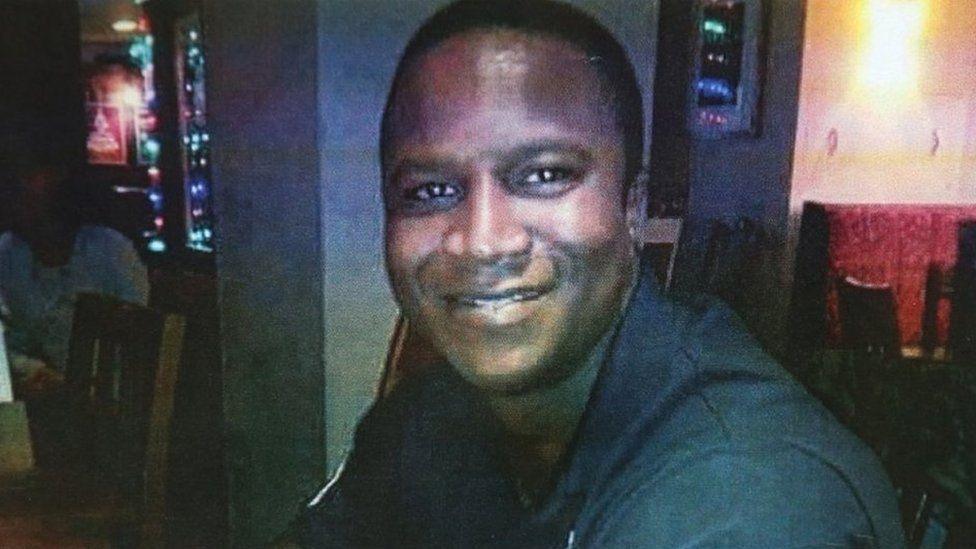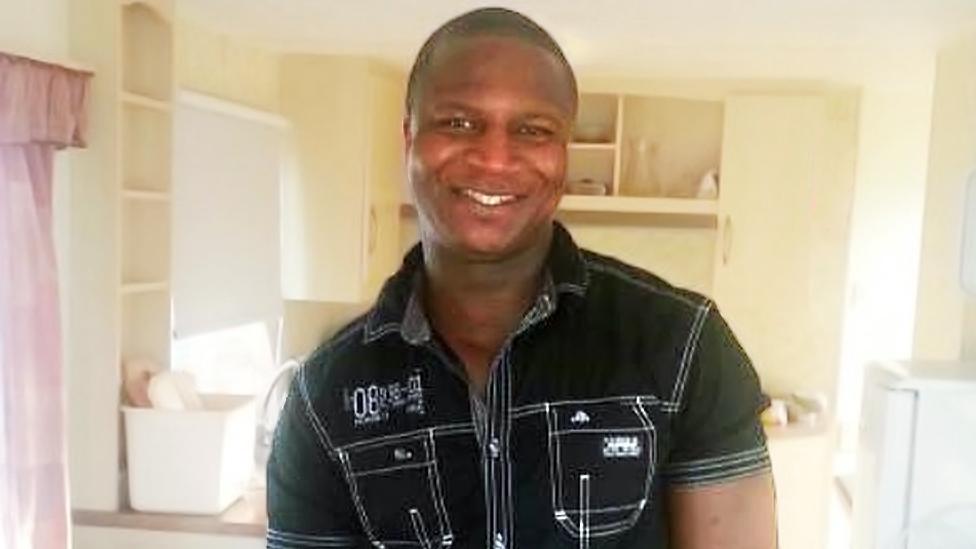Sheku Bayoh inquiry: Pressure may have caused injuries
- Published

Sheku Bayoh died in police custody in 2015
Sheku Bayoh had injuries that could have been caused by weight or pressure being applied to him, a forensic pathologist has said.
Dr Kerryanne Shearer, who conducted the post-mortem, gave evidence as the public inquiry into Mr Bayoh's death resumed.
The 31-year-old died in 2015 after a violent confrontation in Kirkcaldy.
Dr Shearer said she felt under pressure "like never before" to get the examination completed quickly.
Mr Bayoh died after being restrained by police officers in the street, and was found to have suffered 23 separate injuries.
The public inquiry is looking into the circumstances of the father-of-two's death, and whether race was a factor.
Dr Shearer was one of two doctors who carried out the post-mortem on Mr Bayoh.
The forensic pathologist told the inquiry she incorporated information about the use of handcuffs and restraint into her examination.
This found Mr Bayoh had around eight small "dot" haemorrhages in his eyes, consistent with injuries that may have related either to positional asphyxia or being resuscitated.
Dr Shearer also said Mr Bayoh's breathing could have been potentially impeded by officers restraining him, without having to put weight on him.
Asked if there was anything that would indicate weight or pressure being applied, Dr Shearer told the inquiry: "There wasn't anything that was categorically indicative.
"We looked at the back and there was some subcutaneous haemorrhage under the skin, suggesting blunt force was applied.
"I can't categorically say what that blunt force was, but if it is suggested to me, 'could this be someone pressing down?' then yes, it could."

An inquiry into Sheku Bayoh's death is examining whether race was a factor
Dr Shearer told the inquiry that immediately after the post-mortem examination, there was no clear cause of death and it was listed as "unascertained pending investigation."
She said she had conducted investigations throughout the examination that would ultimately lead to the final cause of death.
The inquiry also heard an initial report allowed the police and Crown to "move forward" with their investigations.
Dr Shearer said she had been under pressure to complete the post-mortem examination as quickly as possible after his death.
She said: "I remember at the time when I took the phone call on the Sunday, there was already a lot of media interest and there was a lot of information out there.
"There was police involvement so obviously there were questions as well.
"I do remember there being a reasonable amount of stress and a reasonable amount of pressure to get the post-mortem done as quickly as possible.
"There was pressure I had never felt before [to get post-mortem examination completed as quickly as possible]."
Mouth injury
Dr Shearer also described a superficial injury Mr Bayoh had sustained to his mouth which could be a sign of blunt force by an object, the ground or his tooth.
The forensic pathologist explained it could also have been as a result of medical intervention such as intubation.
She described there being seven superficial cuts to his mouth and lips.
Dr Shearer added: "When you start to see lots of injuries in the mouth, it makes me less inclined to say it's because of resuscitation, and more inclined to say it's because of blunt force trauma."
She also described how these injuries could be sustained by being on the ground and the mouth moving against it which "pulls" the mouth.
The inquiry, before Lord Bracadale, continues.
Related topics
- Published2 March 2023

- Published9 March 2023

- Published28 February 2023
